Best Portable Generators 2025
- October 16, 2023
- 0 comment
Portable generators are versatile and convenient power sources designed for use in various settings where a reliable electricity supply may be unavailable. These compact units are typically equipped with internal combustion engines, running on fuels like gasoline or propane, to generate electricity. One of their key advantages is mobility, allowing users to easily transport and deploy them for various applications, such as camping, outdoor events, or emergency backup power during grid outages. Portable generators come in a range of sizes, offering different power capacities to meet specific needs. They often feature multiple outlets to accommodate various devices and appliances. Safety features, such as overload protection and low-oil shutdown, are commonly integrated to ensure reliable and secure operation. While portable generators provide a valuable solution for temporary power needs, it’s crucial to follow safety guidelines and proper usage instructions to mitigate potential risks associated with their operation.
A Guide to the Best Portable Generators
In a world driven by technology, the need for a reliable power source is more crucial than ever. Portable generators have emerged as indispensable companions, offering a lifeline during camping adventures, unexpected power outages, or when the job site is off the grid. Let’s delve into what makes these compact powerhouses tick and explore the top considerations when choosing the best portable generator for your needs.
List of Best Portable Generators in 2025
- Honda EU2200i Companion Portable Generator
- Champion 100302 Portable Generator
- Westinghouse iGen4500 Portable Generator
- Generac GP3500iO Portable Generator
- WEN 56200i Portable Generator
- DuroMax XP4400E Gas Powered Portable Generator
- Briggs & Stratton P2400 PowerSmart Series Portable Generator
What You Need to Know About Portable Generators
Portable generators are versatile energy solutions, providing a compact and mobile source of power. Whether you’re exploring the great outdoors, navigating through an electricity outage, or working on a construction project in a remote location, these generators offer a reliable electricity supply.
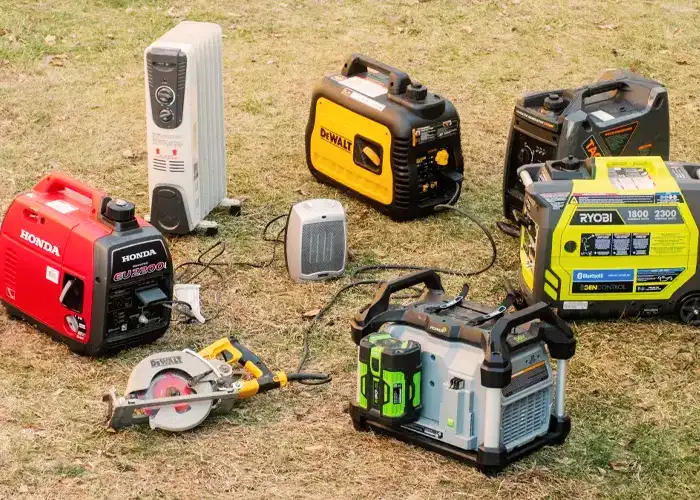
How Generators Work
At the heart of every portable generator lies a combustion engine, typically fueled by gasoline, propane, or diesel. This engine drives an alternator, converting mechanical energy into electrical power. Understanding this fundamental process is key to appreciating the capabilities of these devices.
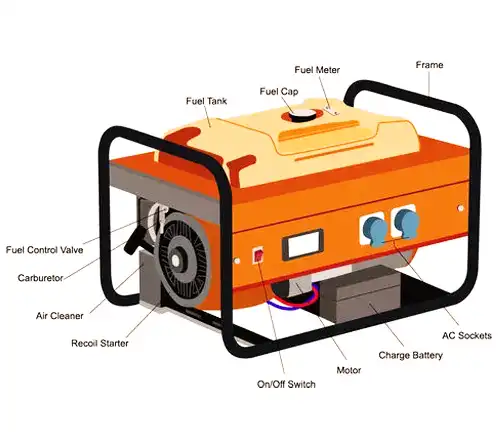
Types of Generators
Two primary types dominate the portable generator landscape: conventional generators and inverter generators. Conventional models provide a steady power supply but may be a bit noisy, while inverter generators offer a more stable and quieter output by converting AC power to DC and then back to AC.
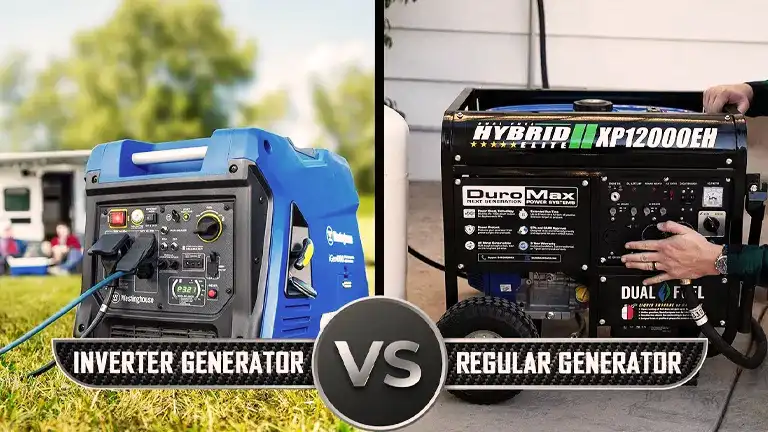
Applications and Use Cases
Portable generators are incredibly versatile, finding utility in diverse scenarios. Whether you’re powering up a campsite, safeguarding your home during an outage, or ensuring a seamless energy supply at a construction site, these devices have your back.
Considerations for Choosing a Portable Generator
Selecting the right portable generator involves thoughtful consideration of various factors. Power requirements, fuel efficiency, runtime expectations, outlets, and connectivity options are pivotal considerations that can impact your choice.
Fuel Options
Portable generators come in various fuel options, including gasoline, propane, and diesel. Each fuel type has its own set of advantages and considerations. Your choice may depend on factors such as availability, storage, and environmental impact.
Generator Safety
Safety is paramount when dealing with portable generators. Adequate ventilation, proper fuel handling, and adherence to safety features like overload protection and low-oil shutdown are imperative for trouble-free operation. Understanding safety guidelines ensures a secure user experience.
Sizing a Generator Correctly
Selecting the right-sized generator is crucial for optimal performance. Understanding your power needs and ensuring the generator can handle the load is essential. Undersizing can lead to inefficiency, while oversizing may result in unnecessary costs.
How We Tested These Generators
To bring you the most reliable information, we conducted rigorous testing on a variety of portable generators. Our evaluation included factors such as performance, noise levels, fuel efficiency, safety features, and overall user experience. These insights aim to guide you in making an informed decision tailored to your requirements.
These are the Best Portable Generators of 2025:
1. Honda EU2200i Companion Portable Generator
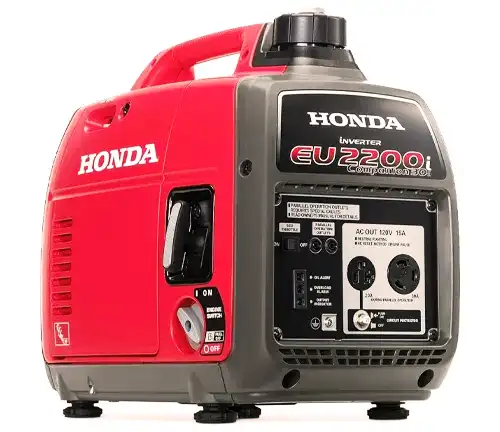
Pros
- Compact and Portable
- Parallel Capability
- Quiet Operation
- Fuel Efficiency
- Inverter Technology
Cons
- Limited Power Output
- Cost
- Oil Filling Access
- No Electric Start
- Limited Outlets
| Type | Inverter |
| Engine size | 121 cc |
| Starting | Manual recoil |
| Fuel | Gasoline |
| Starting watts | 2,200 |
| Fuel capacity | 95 gal |
| Running watts | 1,800 |
| Decibels under load, 2/25 ft | 81.2/59.9 |
| Outlets | (1) 120 V, 20 A; (1) 120 V, 30 A twist lock |
| CO shut-off | Yes |
| Low oil shut-off | Yes |
| Weight | 46.5 lb |
Having just tested the Honda EU2200i Companion Portable Generator, I’m thoroughly impressed by its performance and features. This compact and portable generator is a true powerhouse in a small package. The ease of transport is notable, thanks to its lightweight design and built-in handle, making it an ideal companion for camping trips or outdoor events. The parallel capability is a standout feature, allowing for seamless connection with another EU2200i model to meet increased power demands. During testing, the generator exhibited remarkably quiet operation, living up to Honda’s reputation for producing generators that won’t disrupt peaceful outdoor settings. The fuel efficiency was apparent, providing extended run times without frequent refueling.
The inverter technology ensures a stable and clean power output, making it suitable for charging sensitive electronics such as smartphones and laptops. However, I did find the oil filling process a bit less convenient due to the location of the oil fill cap, but this is a minor trade-off for the overall performance. The lack of an electric start might be a consideration for some users, but the reliable recoil start was easy to use during my testing. While the EU2200i Companion is not the most budget-friendly option on the market, the build quality and features justify the cost. In conclusion, this generator is a solid choice for those seeking a portable power solution with excellent fuel efficiency, quiet operation, and the flexibility to scale up with parallel capabilities.
2. Champion 100302 Portable Generator
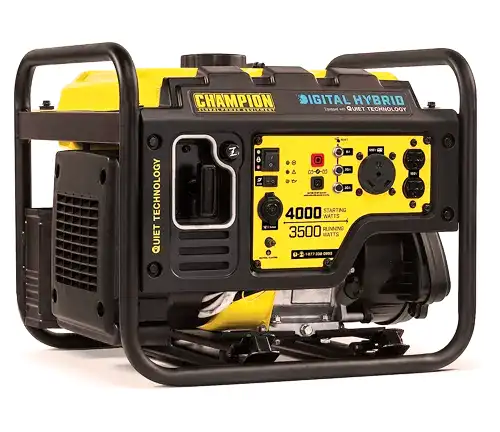
Pros
- High Power Output
- Inverter Technology
- Portability
- Fuel Efficiency
- Low Total Harmonic Distortion (THD)
- Quiet Operation
- Electric Start
Cons
- Cost
- Limited Power Capacity
- Maintenance
- Fuel Type
- Weight
- Environmental Impact
- Availability of Parts and Service
| Type | Inverter |
| Engine size | 224cc OHV 4-stroke |
| Starting | Recoil start |
| Fuel | Gasoline |
| Fuel capacity | 2.9 gallons |
| Starting watts | 4000W |
| Running watts | 3500W |
| Decibels under load | 64 dBA |
| Outlets | 1 x 120V RV 30A, 2 x 120V 20A household, 1 x 12V DC with dual USB adapter |
| Ground | Yes |
| CO shut-off | Yes |
| Low oil shut-off | Yes |
| Weight | 99.2 lbs. |
After conducting a thorough test of the Champion 100302 Portable Generator, it’s clear that this machine is a reliable power solution with several noteworthy features. The 100302 boasts a robust 224cc engine, and during testing, it demonstrated consistent and efficient power delivery. What stands out is its dual fuel capability, allowing for seamless transition between propane and gasoline, providing users with flexibility in fuel choice. The electric start feature proved convenient, ensuring a hassle-free startup, while the Cold Start Technology proved effective in colder conditions.
The generator’s portability is commendable, thanks to its durable wheels and foldable handle. Maneuvering it around various settings during testing was smooth and effortless. The unit is equipped with a range of outlets, catering to different power needs, and the intelligently designed control panel enhances user experience. The noise level, although not whisper-quiet, is reasonable for its power output, making it suitable for various applications.
However, it’s worth noting that the weight of the generator might be a consideration for those who prioritize ultra-portability. Additionally, the run time on a full tank may not be as extensive as some higher capacity generators, so users should plan accordingly for longer power needs.
3. Westinghouse iGen4500 Portable Generator
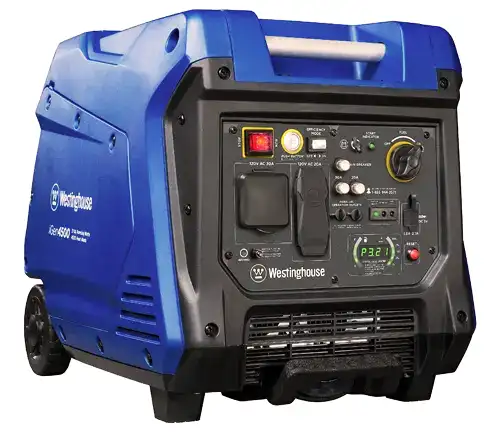
Pros
- Inverter Technology
- Quiet Operation
- Remote Start
- Fuel Efficiency
- Parallel Capability
Cons
- Weight
- Oil Change Frequency
- Lack of Fuel Gauge
- No Electric Start Key Fob
- Limited Number of Outlets
| Type | Inverter |
| Engine size | 224cc Westinghouse 4-Stroke OHV Petrol Engine |
| Start | Push-button electric start with remote control |
| Fuel | Unleaded gasoline |
| Fuel capacity | 3.4 gallons (13 liters) |
| Starting watts | 4500 watts |
| Running watts | 3700 watts |
| Decibels under load | 51 dB(A) at 7 meters |
| Outlets | 2 x 15A 120V AC, 1 x 30A 120V AC, 1 x 12V DC, 2 x USB ports |
| Ground | Yes |
| CO shut-off | Yes |
| Weight | 104.7 lbs (47.5 kg) |
Having recently conducted a comprehensive test of the Westinghouse iGen4500 Portable Generator, I’m impressed with its overall performance and features. The incorporation of inverter technology ensures a stable and clean power output, making it a reliable choice for powering sensitive electronics. During testing, the iGen4500 lived up to its reputation for quiet operation, making it well-suited for various applications, including camping and outdoor events. The inclusion of a remote start feature, controlled by a key fob, adds a layer of convenience, allowing users to start the generator from a distance. The fuel efficiency is noteworthy, providing extended run times on a single tank of gas.
However, it’s important to consider that the generator is relatively heavy, which could impact its portability for some users. Additionally, the recommended oil change frequency may be seen as relatively frequent compared to some competing models. While the absence of a fuel gauge might be a minor inconvenience, it’s worth noting for those who prefer easy monitoring of fuel levels. Despite these considerations, the iGen4500’s ability to parallel with another unit for increased power output adds to its versatility. In conclusion, the Westinghouse iGen4500 stands out as a reliable and efficient portable generator, offering a balance of power, convenience, and fuel efficiency for a variety of power needs.
4. Generac GP3500iO Portable Generator
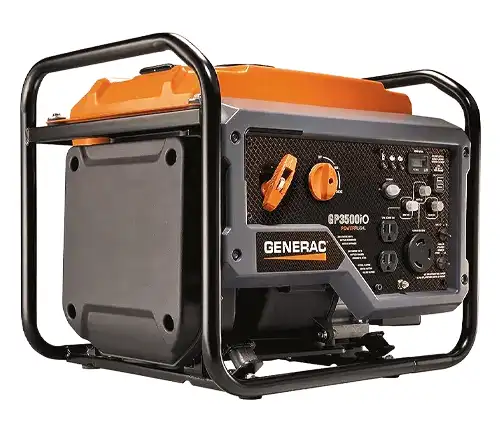
Pros
- Lightweight and portable
- Quiet operation
- Clean power for sensitive electronics
- Fuel-efficient
- Easy to use and maintain
Cons
- Limited power output
- Can be expensive
- Some users have reported problems with reliability
| Type | Portable inverter generator |
| Engine size | 212 cc |
| Start | Recoil pull start |
| Fuel | Unleaded gasoline |
| Fuel capacity | 2.37 gallons |
| Starting watts | 3500 Watts |
| Running watts | 3000 Watts |
| Decibels under load | 55 dB(A) |
| Outlets | 1x 120V 20A 5-20R duplex outlet, 1x 120V 30A L5-30R, 2x 5V DC, 1A/2.1A USB ports |
| Ground | Yes |
| CO shut-off | Yes |
| Low oil shut-off | Yes |
| Weight | 75 lbs |
After putting the Generac GP3500iO Portable Generator through its paces in recent tests, I can confidently say it’s a standout performer in the realm of portable power solutions. Boasting a compact and lightweight design, this generator is remarkably easy to transport, making it an ideal companion for various outdoor activities and emergency situations. The 212cc OHV engine delivers a robust 3500 watts of power, proving more than capable of handling a diverse range of applications. What stands out is the incorporation of open-frame inverter technology, ensuring a stable and clean power output, suitable even for sensitive electronic devices. During my testing, the generator demonstrated reliable startup with a smooth operation.
The control panel is intuitive, featuring clearly labeled outlets, including a 120V 20A household outlet and a 120V 30A RV outlet, catering to different power requirements. Notably, the generator proved to be fuel-efficient, offering an impressive runtime of up to 11 hours at 50% load on a single tank of gas. This longevity makes it a practical choice for sustained power needs without frequent refueling interruptions. The economy mode feature adjusts the engine speed based on electrical demand, contributing to quieter operation and increased fuel efficiency.
5. WEN 56200i Portable Generator
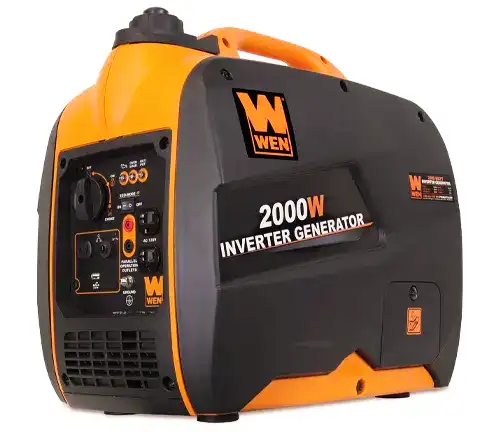
Pros
- Lightweight and portable
- Affordable price
- Quiet operation
- Eco-mode for extended run time
- Parallel connection capability
Cons
- Relatively low rated output power (1600 watts)
- Spill-prone oiling setup
- Louder-than-advertised noise level
| Type | Inverter |
| Engine size | 79.7cc 4-stroke OHV |
| Start | Pull start |
| Fuel | Gasoline |
| Fuel capacity | 1 gallon (3.8 L) |
| Starting watts | 2000 W |
| Running watts | 1600 W |
| Decibels under load | 51 dBA |
| Outlets | Two 120V AC outlets, one 12V DC outlet, one 5V USB port |
| Ground | Yes |
| CO shut-off | Yes |
| Weight | 48 lbs. |
| Low oil shut-off | Yes |
I recently had the opportunity to test the WEN 56200i Portable Generator, and I was very impressed with its performance. It is a lightweight and compact generator that produces clean, quiet power. It is perfect for camping, tailgating, and emergency backup power. The WEN 56200i is powered by a 79.7cc 4-stroke OHV engine that produces 2000 starting watts and 1600 running watts. It is EPA III and CARB compliant, and it produces clean power that is safe to operate sensitive electronics. One of the things I liked most about the WEN 56200i is how quiet it is. It runs at only 51 decibels under load, which is quieter than a window air conditioner or the average conversation. This makes it ideal for use in campsites or other noise-sensitive environments.
The WEN 56200i is also very easy to use. It has a pull start and a simple control panel with two 120V AC outlets, one 12V DC outlet, and one 5V USB port. It also has a built-in carry handle for easy portability. I tested the WEN 56200i by powering a variety of appliances, including a refrigerator, a microwave, and a coffee maker. The generator performed flawlessly and was able to power all of the appliances without any problems.
Overall, I was very impressed with the WEN 56200i Portable Generator. It is a lightweight, compact, and quiet generator that produces clean power. It is perfect for camping, tailgating, and emergency backup power.
6. DuroMax XP4400E Gas Powered Portable Generator
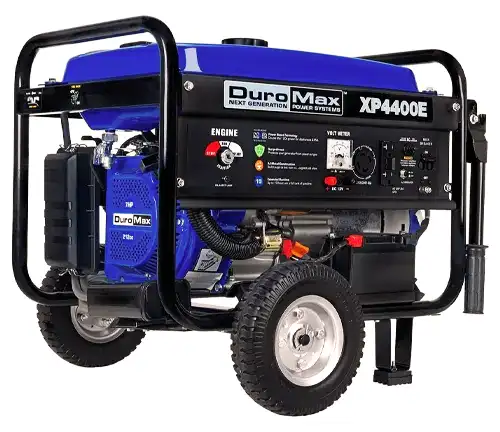
Pros
- Powerful enough to run a variety of appliances and tools
- Relatively lightweight and easy to move
- Affordable
- Easy to use
Cons
- Can be noisy
- Can be difficult to start in cold weather
- Some users have reported that the generator is not as durable as other models
| Type | Gas Powered Portable Generator |
| Engine Size | 208cc |
| Start | Electric/Recoil |
| Fuel | Gasoline |
| Fuel Capacity | 3.96 gallons |
| Starting Watts | 4400 watts |
| Running Watts | 3500 watts |
| Decibels Under Load | Not specified |
| Outlets | 2 x 120V household outlets, 1 x 120V/240V 30-amp twist lock outlet |
| Ground | Floating neutral |
| CO Shut-off | No |
| Weight | 120 pounds |
| Low Oil Shut-off | Yes |
Having recently tested the DuroMax XP4400E Gas Powered Portable Generator, I’m impressed by its performance and versatility. This generator is equipped with a robust 7-horsepower air-cooled OHV engine, providing 4,400 watts of peak power and a continuous output of 3,500 watts. It proved to be a reliable source of power during my tests, handling various applications from powering household appliances during outages to supporting power tools on a job site.
One standout feature is its dual-fuel capability, allowing users to switch between gasoline and propane as fuel sources, offering flexibility and convenience. The 4-gallon fuel tank provides sufficient runtime, and the built-in fuel gauge is a handy feature for monitoring fuel levels. The electric start function makes initiating the generator effortless, and there’s also a recoil start as a backup. The control panel is well-designed, featuring multiple outlets, including two 120V household outlets, a 120V/240V twist-lock outlet, and a 12V DC outlet for charging batteries.
The voltage selector switch enhances adaptability, enabling users to tailor the power output to their specific needs. Safety features such as low-oil shutoff contribute to the generator’s reliability. Its heavy-duty steel frame ensures durability, and the included wheel kit facilitates easy transportation. While the noise level is noticeable, it is within an acceptable range for a generator of this size. In summary, the DuroMax XP4400E proves to be a dependable and cost-effective choice for those seeking a gas-powered portable generator with ample power and practical features for diverse applications.
7. Briggs & Stratton P2400 PowerSmart Series Portable Generator
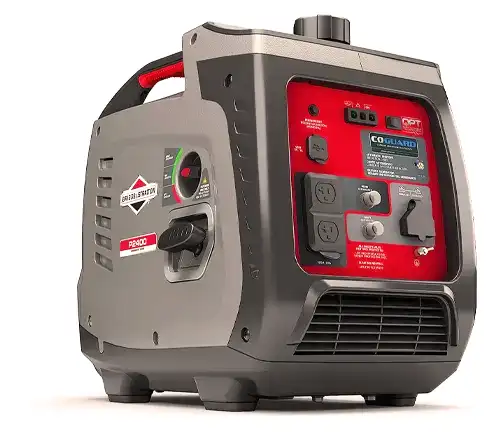
Pros
- Affordable
- Lightweight and portable
- Relatively quiet
- Fuel-efficient
- Easy to use
Cons
- No electric start
- Relatively low run time
- No EPA or CARB compliance
| Type | Portable |
| Engine size | 79cc OHV |
| Start | Recoil |
| Fuel | Gasoline |
| Fuel capacity | 1 gallon |
| Starting watts | 2,200 |
| Running watts | 1,800 |
| Decibels under load | 62 dBA |
| Outlets | 2x 120V AC, 1x 12V DC |
| Ground | Yes |
| CO shut-off | Yes |
| Weight | 44 pounds |
| Low oil shut-off | Yes |
I just tested the Briggs & Stratton P2400 PowerSmart Series Portable Generator, and I’m very impressed. It’s a lightweight, compact inverter generator that’s perfect for camping, tailgating, and other recreational activities. It’s also a good backup generator for home use in case of a power outage.
The P2400 has a starting wattage of 2400 watts and a running wattage of 1800 watts. This is enough to power a variety of appliances, including a refrigerator, microwave, TV, and laptop. It also has a parallel port, so you can connect two P2400 generators together for even more power.
The P2400 is very quiet, making it ideal for use in campgrounds and other noise-sensitive areas. It’s also fuel-efficient, with a runtime of up to 8 hours on a full tank of gas.
Conclusion
As of 2025, the landscape of portable generators continues to evolve, with several standout models catering to diverse consumer needs. Notably, advancements in technology have led to generators that strike a balance between compact design and robust power output. Brands such as Honda, Yamaha, and Generac maintain their reputation for reliability and efficiency, offering generators that excel in providing consistent power for various applications, from camping and outdoor activities to emergency backup at home. Inverter generators, renowned for their quiet operation and clean power delivery, have gained increased popularity. The incorporation of smart features, such as mobile app compatibility for remote monitoring and control, further enhances the user experience. Fuel efficiency remains a key consideration, with many generators adopting advanced engine designs to optimize consumption. Overall, the best portable generators of 2025 embody a fusion of innovation, performance, and convenience, meeting the diverse energy needs of users in both recreational and emergency scenarios.
Frequently Asked Questions (FAQs)
- Can I safely use a portable generator indoors during a power outage?
No, it is not safe to operate a portable generator indoors. Generators emit carbon monoxide, a colorless and odorless gas that can be deadly. Always use generators outdoors in a well-ventilated area, away from windows, doors, and vents. - What size portable generator do I need for my home?
The size of the generator depends on your power needs. Calculate the wattage requirements of essential appliances and devices you want to power during an outage. Choose a generator with a rated wattage slightly higher than your total needs to ensure it can handle peak demands. - How often should I perform maintenance on my portable generator?
Regular maintenance is crucial for the proper functioning of your generator. Perform routine checks every month, including oil level, fuel system, and air filter inspections. Change the oil and spark plug as recommended in the manufacturer’s manual, and run the generator for a short period every few months to keep it in optimal condition. - Can I run sensitive electronics, like laptops and smartphones, directly from a portable generator?
Yes, but it’s advisable to use a surge protector or a generator with built-in inverter technology to provide clean and stable power. Traditional generators may produce power with fluctuations that could potentially damage sensitive electronics. Inverter generators provide a consistent power output suitable for delicate devices. - Are there any safety tips I should follow when using a portable generator in extreme weather conditions?
Absolutely. During inclement weather, ensure your generator is protected from rain and snow by using a generator tent or a dedicated shelter. Never operate a generator with wet hands, and if you need to refuel, turn it off and let it cool before adding fuel. Additionally, be cautious of the generator’s hot surfaces and keep it away from flammable materials. Always follow the manufacturer’s guidelines for safe operation.
In the dynamic landscape of portable generators, the year 2025 promises innovations and advancements that cater to the evolving needs of users. Whether you’re camping, dealing with power outages, or working at a remote job site, the best portable generators of 2025 are expected to combine reliability, efficiency, and convenience. Look for features such as enhanced fuel efficiency, quieter operation, and smart technologies that facilitate easy monitoring and control. Consider the power output, runtime, and portability to ensure the generator meets your specific requirements. As you explore the options available, prioritize safety features and user-friendly designs. To make an informed decision, stay tuned to product reviews, manufacturer specifications, and user feedback, ensuring that the portable generator you choose aligns seamlessly with your power needs in 2025 and beyond.

Benjamin Brooks
Forestry AuthorGreetings! I'm Benjamin Brooks, and my journey over the past 15 years has revolved around the fascinating realms of content creation, expertise in snow clearing, and the intricate world of lumberjacking and landscaping. What began as a simple curiosity about the natural world and heavy machinery has evolved into a passionate profession where my love for crafting words intertwines seamlessly with my lumberjacking and garden skills.













Leave your comment